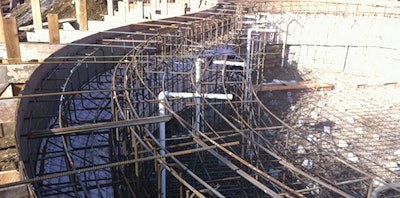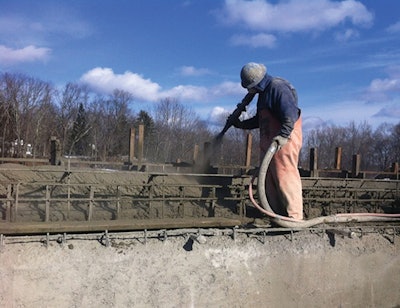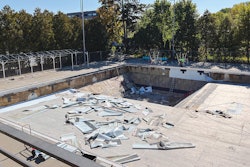
Building swimming pools and spas can be a surprisingly complex and multifaceted process. From the initial customer contact to filling the vessel with water, success means managing, integrating, coordinating and recording every step along the way.
That's why most builders will testify that the most important person in the process, second only to the client, is the project manager. More than the salesperson, designer or even company president, the man or woman overseeing the physical work on site is the linchpin to success or failure.
Needless to say, there's a lot resting on a project manager's shoulders. Fortunately, today's software programs have sophisticated features that streamline and accelerate the production process from concept to completion.
THE SIMPLE THINGS
In many respects, technology has changed project management in much the same way it has altered daily life for almost everyone. Today's contractors can instantly communicate with clients and vendors, update databases, manage payments and more, all from a single device. In fact, such features have become so familiar that they are easily taken for granted.
To a large extent, that means everything can happen at a dramatically increased pace. According to Bill Drakeley, principal and founder of Drakeley Pools in Bethlehem, Conn., "It's set a new bar in terms of the speed with which a job takes place, largely because the communication is so fast now.
"For example, we have an acrylic panel being delivered to a job site today. So once I get a text from the vendor that it is on its way, I forward it to my foreman, who then instantly contacts the crew and the homeowner. He then can track the progress of the truck online and if there's any delay, he's not sitting there at the site with crew wondering what happened. Almost every aspect of a project is like that; everybody can see the same documents and information all the time. That immediate access to information has dramatically sped up how fast these projects can move forward."
For many builders, the integration of technology in project management has been a natural extension of the way devices and apps have become infused in their personal lives.
RELATED: Technology: A Small Business's Secret Weapon
"Everything has been changed by technology," says Brett Handy, owner/president of Paragon Pools, a builder based in Lake City, Fla. "For example, when we start a project, we create a group text that includes everybody involved in the project. It's simple things, when I get a text from the supplier confirming the delivery time I share that with the foreman immediately. It's an incredibly easy thing to do and enables everyone to know what's going on in real time."
"We also create a project folder in Google drive," Handy adds. "We include everything that has to do with that project: proposals, contracts, product specs, schedules, drawings and whatever information the guys in the field need to keep the work on track. They have instant access, there's no waiting when you need to share information. The way we use technology it becomes second nature because it's not all that different from the way that people use things like their laptops, smartphones and tablets in daily life."
And just as many people have come accustomed to navigation technology, so too have GPS systems impacted the movements of crews and materials. According to Drakeley, "If there's ever any question about where our people are at any given time, we can tell the exact moment our truck pulled into the driveway and the exact moment it left."
 From excavation to shotcrete and finish details, managers use digital technology to keep projects on track and running efficiently.
From excavation to shotcrete and finish details, managers use digital technology to keep projects on track and running efficiently.
All photos courtesy of Drakeley Pools
QUICK LOOKS
There are many facets to project management including customer relations, scheduling, working with inspectors — even dealing with angry neighbors. But the most critical aspect is visually inspecting the work to be sure that it's done correctly per the plan and contract.
In that sense, the ability to instantly take and share photos is arguably the biggest modern technical advantage. "Every day, our foremen are taking pictures with their phones," Handy says. "The images are in Google drive and I'm able to review them almost in real time. If there's a question about what was done on the job or some kind of technical question that needs answering, we take care of it right away. It's fantastic when homeowners have questions and I can instantly pull up the folder, look at photos and almost always answer their question. That sounds so simple it's almost silly, but it's completely changed how jobs are managed. It's funny to think that 10 years ago we were just starting to do that and 20 years ago we hadn't even thought of it."
RELATED: Rendering the Future
Not only does instant access to photos facilitate communication and problem solving, but it also elevates the sense of responsibility and accountability among crewmembers.
"It keeps the jobsite going the way everybody expects it to go," Handy says. "That is, when everybody knows pictures are being taken and are being reviewed. For example, I'm pretty big on not leaving trash laying around. It's something we see all the time throughout the construction industry, but for me, it's a big pet peeve and I don't allow it. So if I see trash in the photos on a given day, that's a conversation that happens pretty quickly."
The good news is, he says, that almost never happens — largely because everyone on the project is aware of the policy and knows the site is photographed and inspected every day.
 Software has made it easier for builders to accurately price their designs and bill accordingly.
Software has made it easier for builders to accurately price their designs and bill accordingly.
All photos courtesy of Drakeley Pools
DEEPER INTEGRATIONS
While everyday technology can have a transformative impact on project management, industry-specific management software can magnify and expand all of those benefits — and offer additional advantages as well.
Software manufacturer RB Control Systems specializes in providing a customizable software package for pool and spa retailers, service techs and builders. According to Rachael Pritz, the company's executive director, builders have everything to gain by integrating information from customer leads through project completions.
"What we've found is that when companies do use our system to manage their projects, they discover that they weren't making the margins that they thought they were making on these jobs. There are a lot of people in the industry that are kind of old-school and haven't embraced technology and systems that can increase efficiencies and control costs," she explains. "Many people will simply say that they know from experience how much it costs to build a pool. We have dealers that come to us who have working off pen and paper and have been managing their business for 20-plus years writing up handwritten receipts or invoice. Now with the generational shift in the industry, the millennials want to do everything on computer."
RELATED: Keeping Pace with Technology
The list of tasks that can be integrated on project/process management software is impressive and constantly growing. By using a system where the different aspects of a job are integrated, Pritz explains that builders are able to monitor everything from start to finish, tracking the leads and where they come from, job costing, generating quotes and contracts and having those documents available to everyone in the field. "They can send everything by text or email directly from the software," she explains. "They can create kits that apply to a particular type of pool where you standardize the costs of materials and pricing.
Quotes can be turned into purchase orders that are automatically emailed to the vendor.
And when the work begins, every facet of the project is integrated. "Throughout the progress of the project, you're keeping track of the work from a time standpoint, from a labor standpoint, from a scheduling standpoint and from a money standpoint," Pritz explains. "You know how much you're spending at any given' point and you know when you need to bill the customer. You're eliminating the guesswork by streamlining every aspect of the project."
The bottom line, she says, "From start to finish, if you're not organized you're going to be losing money."
NOT SO FAST
For all of the many benefits of digitizing the project management process, Drakeley cautions that there remain many aspects of the work that will never change.
"The risk comes in when you move so fast and come to rely on the technology to do your thinking for you," he says. "It's an amazing set of tools, but there are aspects of project management that require know-how, professionalism and the hands-on approach. When you're in the pool business and you need experience, technology is not going to help you.
"If I engineer a job incorrectly," he adds, "if the shotcrete and steel aren't properly specified and installed, if I make a serious mistake on any number of key project phases, odds are those mistakes will echo through the project and create any number of possible problems and failures. There's no computer program, smartphone or high-definition screen that can fix that.
"As is true of most any kind of system or tool, it's how it's used that determines how much benefit you realize," he says. "Technology is great so long as the people using know what they're doing in the first place."








































